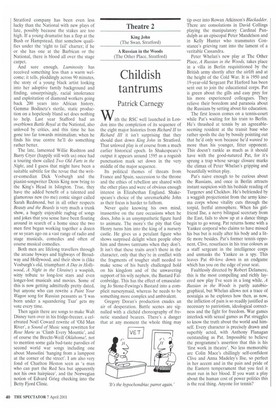Childish tantrums
Patrick Carnegy
With the RSC well launched in London into the completion of its sequence of the eight major histories from Richard II to Richard III it isn't surprising that they should dust down King John in Stratford. That unloved play is of course from a much earlier historical epoch. In Shakespeare's output it appears around 1595 as a roguish punctuation mark set down in the very middle of the major sequence.
Its political themes of threats from France and Spain, succession to the throne and the ethics of rebellion are shared with the other plays and were of obvious enough interest in Elizabethan England. Shakespeare's choice of the unremarkable John as their focus is harder to fathom.
Never quite knowing his own mind, inassertive on the rare occasions when he does, John is an unsympathetic figure hard to animate. The more's the pity that Guy Henry turns him into the king of a nursery castle. He gives us a petulant figure who shows surprised delight when people obey him and throws tantrums when they don't. It isn't that these traits aren't there in the character, only that they're in conflict with the fragments of tougher stuff needed to make sense of his barely challenged hold on his kingdom and of the unwavering support of his wily nephew, the Bastard Falconbridge. This has the effect of emasculating Jo Stone-Fewings's Bastard into a complicit nurserymaid, whereas he needs to be something more complex and ambivalent.
Gregory Doran's production exudes an air of desperation. Battle scenes are signalled with a cliched choreography of frenetic standard bearers. There's a danger that at any moment the whole thing may tip over into Rowan Atkinson's Blackadder. There are consolations in David Collings playing the manipulatory Cardinal Pandulph as an episcopal Peter Mandelson and in Kelly Hunter who transmutes Constance's grieving rant into the lament of a veritable Cassandra.
Peter Whelan's new play at The Other Place, A Russian in the Woods, takes place in a villa in Berlin requisitioned by the British army shortly after the airlift and at the height of the Cold War. It is 1950 and 19-year-old Sergeant Pat Harford has been sent out to join the educational corps. Pat is green about the gills and easy prey for his more experienced colleagues. They relieve their boredom and paranoia about the Russians by setting about his education.
The first lesson comes on a tennis-court while Pat's waiting for his train to Berlin. He's thrashed at tennis by an agreeableseeming resident at the transit base who rather spoils the day by bossily pointing out that he'd only won because he'd wanted to more than his younger, fitter opponent. This doesn't rankle as much as it should have with the good-natured Pat, for it's sprung a trap whose savage closure marks the climax of Peter Whelan's gripping and beautifully written play.
Pat's naive enough to be curious about the Russians, and once in Berlin attracts instant suspicion with his bedside reading of Turgenev and Chekhov. He's befriended by a waggish projectionist from the army kinema corps whose vitality cuts through the torpid, fretful atmosphere. When his girlfriend Ilse, a nervy bilingual secretary from the East, fails to show up at a dance things begin to go wrong. Pat returns home with a Yankee corporal who claims to have missed his bus but is really after his body and a little more besides. Pat's former tennis opponent, Clive, resurfaces in his true colours as a staff sergeant in the intelligence corps and unmasks the Yankee as a spy. This leaves Pat 40—love down in an endgame which has you on the edge of your seat.
Faultlessly directed by Robert Delamere, this is the most compelling and richly layered new play I've seen in a long while. A Russian in the Woods is partly autobiographical, but Whelan allows not a trace of nostalgia as he explores how then, as now, the infliction of pain is so readily justified as necessary to patriotism, ideological correctness and the fight for freedom. War games interlock with sexual games as Pat struggles to know the truth about the world and himself. Every character is precisely drawn and superbly acted, with Anthony Flanagan outstanding as Pat. Impossible to believe the programme's assertion that this is his 'first work in theatre'. No less memorable are Cohn Mace's chillingly self-confident Clive and Anna Madeley's Ilse, so perfect in her accent and in the pain and pride of the Eastern temperament that you feel it must run in her blood. If you want a play about the human cost of power politics this is the real thing. Anyone for tennis?


























































 Previous page
Previous page